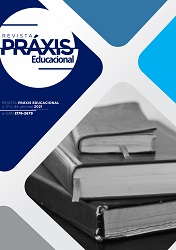WHATSAPP® COMO PROLONGAMENTO DE ESPAÇO FORMATIVO: NARRATIVAS DE PROFESSORES DE LÍNGUA INGLESA DE ESCOLAS PÚBLICAS MUNICIPAIS DE FEIRA DE SANTANA
DOI:
https://doi.org/10.22481/praxisedu.v17i44.6829Palavras-chave:
Tecnologias digitais, Espaço formativo docente, WhatsApp®Resumo
No contexto das tecnologias digitais e da popularização dos aplicativos, o objetivo do artigo é investigar se um grupo no WhatsApp®, composto por professores de Língua Inglesa, dos anos finais do Ensino Fundamental, de escolas públicas municipais, de Feira de Santana, se configura enquanto espaço de prolongamento da formação continuada ocorrida em 2018. A metodologia utilizada foi a qualitativa, de cunho descritivo e analítico, inspirada na netnografia, com base na exportação e análises de registros de narrativas produzidas pelo grupo de professores. Com o estudo pudemos concluir que existe um crescente engajamento dos professores com o compartilhamento de conteúdos e que eles utilizam as informações contidas nesse grupo para sua formação profissional e, consequentemente, para mudanças nas suas práticas pedagógicas.
Downloads
Metrics
Referências
and collaborative applications for student Project. South African Computer Journal, 2017.
Disponível em: http://sacj.cs.uct.ac.za/index.php/sacj/article/view/470
FONDEVILA-GÁSCON, Joan-Francesc.; et al. Use of Social Networking Sites and Instant
Messaging Applications for University-Related Work and Studying. Observatorio
Journal: 2017. Disponível em: <http://www.scielo.mec.pt/pdf/obs/v11n3/v11n3a02.pdf>
FREIRE, Paulo. Pedagogia da autonomia: saberes necessários à prática educativa. São
Paulo: Paz e Terra, 1996 (Coleção Leitura).
GIL, Antônio Carlos. Como elaborar projetos de pesquisa. 4 ed. São Paulo: Atlas, 2002.
GOLDENBERG, Mirian. A arte de pesquisar: como fazer pesquisa qualitativa em
Ciências Sociais. 8ª ed. Rio de Janeiro: Record, 2004.
KENSKI, Vani Moreira. Tecnologias e ensino presencial e a distância. Campinas, SP:
Papirus 2003.v9.157p.
KOZINETS, Robert V. Netnografia: realizando pesquisa etnográfica online (tradução:
Daniel Bueno) Porto Alegre : Penso, 2014.
LÉVY, Pierre. Cibercultura. Tradução de Carlos Irineu da Costa. São Paulo: Ed. 34, 1999.
LUCENA, Simone; PEREIRA, Socorro Aparecida Cabral; OLIVEIRA, Arlene Araújo
Domingues. Redes e Fluxos na Iniciação à Docência: o WhatsApp® Messenger como
espaçotempo de formação no Programa Institucional de Iniciação à Docência. p. 109-
126. In: COUTO, Edvaldo; PORTO, Cristiane; SANTOS, Edméa (Org.). App-learning:
experiências de pesquisa e formação. Salvador: EDUFBA, 2016.
OLIVEIRA NETO, Antonio Alves de; VERSUTI, Andrea; VAZ, Wesley F. Perspectivas
para o uso do WhatsApp® Messenger no estímulo à aprendizagem dos sujeitos. p. 227-
244. In: COUTO, Edvaldo; PORTO, Cristiane; SANTOS, Edméa(Org.). App-learning:
experiências de pesquisa e formação. Salvador: EDUFBA, 2016.
PORTELA, Girlene Lima. Abordagens teórico-metodológicas. Projeto de Pesquisa no
ensino de Letras para o Curso de Formação de Professores da UEFS, 2004. Disponível
em: <http://www.girleneportela.com> Acesso em 12 mai. 2020.
PORTO, Cristiane; OLIVEIRA, Kaio; CHAGAS, Alexandre (Org.) Whatsapp e educação:
entre mensagens, imagens e sons. Salvador: EDUFBA, 2017.
RECUERO, Raquel. Curtir, compartilhar, comentar: trabalho de face, conversação e
redes sociais no Facebook. Revista Verso e Reverso. Vol. XXVIII, n. 68, Maio-Agosto,
2014, p. 114-124.
SANTOS, Edméa. Mídias sociais e Mobilidade em Tempos de Cibercultura: Educando
na Escola, nas Cidades e no Ciberespaço. p.49-61. In: RAMAL, Andréa; SANTOS, Edméa
(Org.). Mídias e tecnologias na educação presencial e a distância. 1ª ed. Rio de Janeiro: LTC,
2016.
SILVA, Ana Elisa Drummond Celestino; COUTO, Edvaldo. Cultura da mobilidade:
relações de professores com o smartphone. p. 121-138 .In: PORTO, Cristiane (org) et al.
Pesquisa e Mobilidade na cibercultura: itinerâncias docentes. Salvador: Edufba, 2015.
WELLER, Wivian; PFAFF, Nicolle (org). Metodologia da pesquisa qualitativa em
educação – Teoria e prática.2 ed. Petrópolis, RJ: Vozes, 2011.
WHATSAPP. WhatsApp® Inc. 2018. Disponível em: <http://www.whatsapp.com>. Acesso
em: 25 nov. 2018.
Downloads
Publicado
Como Citar
Edição
Seção
Licença
Copyright (c) 2021 Práxis Educacional

Este trabalho está licenciado sob uma licença Creative Commons Attribution-ShareAlike 4.0 International License.
Você é livre para:
Compartilhar - copia e redistribui o material em qualquer meio ou formato; Adapte - remixe, transforme e construa a partir do material para qualquer propósito, mesmo comercialmente. Esta licença é aceitável para Obras Culturais Livres. O licenciante não pode revogar essas liberdades, desde que você siga os termos da licença.
Sob os seguintes termos:
Atribuição - você deve dar o crédito apropriado, fornecer um link para a licença e indicar se alguma alteração foi feita. Você pode fazer isso de qualquer maneira razoável, mas não de uma forma que sugira que você ou seu uso seja aprovado pelo licenciante.
Não há restrições adicionais - Você não pode aplicar termos legais ou medidas tecnológicas que restrinjam legalmente outros para fazer qualquer uso permitido pela licença.










